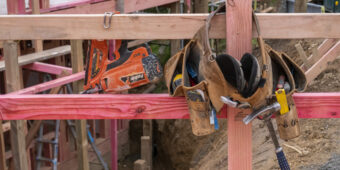LBP report shows Code of Ethics influence
08 May 2025, Industry News, LBP & Regulation, News, Uncategorized

The Building Practitioners Board (BPB) Annual Report for 2023/24, released in October 2024, provides a comprehensive overview of the Board’s activities and the state of the Licensed Building Practitioners (LBP) scheme in New Zealand. The latest report reveals that the Code of Ethics is having an impact on LBPs, and that complaint numbers are roughly holding steady compared to previous years
The BPB, established under Part 4 of the Building Act 2004, is responsible for overseeing the LBP scheme. Its primary functions include hearing appeals against licensing decisions, investigating and hearing complaints about LBPs, approving rules related to LBPs, and annually reviewing and reporting on its operations to the Minister for Building and Construction. The Board operates independently but is supported by the Ministry of Business, Innovation and Employment (MBIE) in performing its duties.
In 2023/24, the Board report revealed it received, considered, initiated or upheld:
- 180 complaints.
- 29 licensing appeals.
- 193 investigations.
- 234 complaints / board enquiries.
- 16 inquiries.
- 71 complaints / board inquiries.
Appeals
The Board exceeded its target to determine 85% of appeals within 60 working days of receipt of the complete appeal, with 90% of appeals determined within the required timeframe.
Complaints
Any person may complain to the Board about the conduct of an LBP. The number of complaints received for 2023/2024 (180) remained around the same level as previous years (169 in 2021/22 and 209 in 2022/23). Of those 180 complaints, 95 did not proceed to a hearing.
A complaint may not proceed to a hearing for various reason, including, but not limited to:
- If it is found not to come within at least one of the grounds for discipline.
- If the subject of the complaint is found to be minor or trivial.
- If investigation is not practicable or is unnecessary.
- If the complaint is found to be frivolous, vexatious or not made in good faith.
The 16 inquiries initiated by the Board in 2023/24 was five more than in 2022/23 but nine less than in 2021/22.
92% of complaints were determined within 60 working days of the date of the hearing.
Of the 91 complaints/board inquiries heard in 2023/24, 71 (77%) were upheld
“The number of LBPs disciplined equates to less than 1% of the total number of licences held in the Scheme,” stated the report.
Notably, there was an increase in complaints alleging breaches of the LBP Code of Ethics, reflecting the Code’s growing influence since its enforcement began in October 2022.
“The number of complaints that allege or include an allegation of a breach of the Code of Ethics for LBPs or disreputable conduct has increased,” said Board Chair Mel Orange. “While that was expected with the introduction of the Code, the overall number of complaints and the matters complained about have not been as high or as serious as was anticipated.”
Other common complaint themes included:
- LBPs using building consent authorities as quality control.
“[Where] LBPs have relied on the inspection or consent process to identify issues with work, rather than building or designing it right the first time,” stated the report.
- Poor application of supervision.
“Poor or inadequate supervision of non-licensed persons resulting in noncompliant building work continues to be a theme.”.
- Failure to obtain a building consent.
“An LBP proceeds with work that requires a building consent without first ensuring that one is in place.”
- Failing to provide a Record of Work once Restricted Building Work is complete.
“Record of work complaints continue to be disproportionately high, and some LBPs are still withholding them for payment reasons. LBPs are not allowed to withhold Records of Work to extract payment from clients.”
- Negligent or incompetent building work.
“This is the most common ground of complaint. It can include design work and unconsented building work.”
- False belief that working as a sub-contractor eliminates LBP obligations.
Penalties
Fines were the most common penalty – imposed in 56 of 74 cases. The next most common penalty was censure (8), followed by licence cancellation (7).
“Of those LBPs disciplined, the Board ordered that further publication of the decision be carried out for 15 LBPs to alert the industry and public to the severity of their offending,” stated the report. “The Board only orders further publication of an LBP’s name and offending when there is a perceived need for the public and/or profession to know the findings of the hearing.”
For Code of Ethics breaches, the Board will be moving away from educative approaches when imposing penalties in favour of a more punitive approach, said Board Chair Orange.
Operational enhancements
To streamline operations, the Board has implemented measures such as remote hearing systems and draft decision processes. These initiatives have facilitated fair and efficient hearings while reducing costs and disruptions for witnesses. The Board continues to focus on enhancing its processes to maintain the integrity and effectiveness of the LBP scheme.
Register to earn LBP Points Sign in






